Mises, Ludwig von. Theory and History: An Interpretation of Social and Economic Evolution
Подождите немного. Документ загружается.

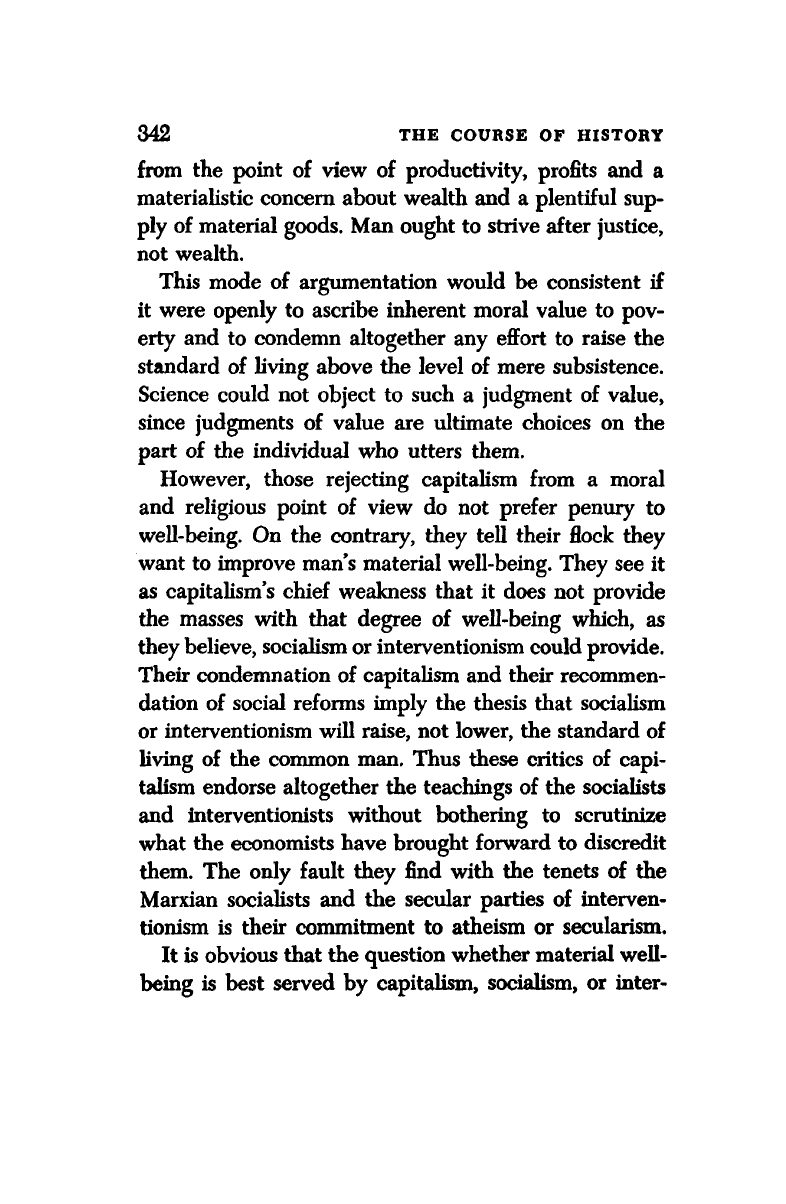
342 THE COURSE OF HISTORY
from the point of view of productivity, profits and a
materialistic concern about wealth and a plentiful sup-
ply of material goods. Man ought to strive after justice,
not wealth.
This mode of argumentation would be consistent if
it were openly to ascribe inherent moral value to pov-
erty and to condemn altogether any effort to raise the
standard of living above the level of mere subsistence.
Science could not object to such a judgment of value,
since judgments of value are ultimate choices on the
part of the individual who utters them.
However, those rejecting capitalism from a moral
and religious point of view do not prefer penury to
well-being. On the contrary, they tell their flock they
want to improve man's material well-being. They see it
as capitalism's chief weakness that it does not provide
the masses with that degree of well-being which, as
they believe, socialism or interventionism could provide.
Their condemnation of capitalism and their recommen-
dation of social reforms imply the thesis that socialism
or interventionism will raise, not lower, the standard of
living of the common man. Thus these critics of capi-
talism endorse altogether the teachings of the socialists
and interventionists without bothering to scrutinize
what the economists have brought forward to discredit
them. The only fault they find with the tenets of the
Marxian socialists and the secular parties of interven-
tionism is their commitment to atheism or secularism.
It is obvious that the question whether material well-
being is best served by capitalism, socialism, or inter-
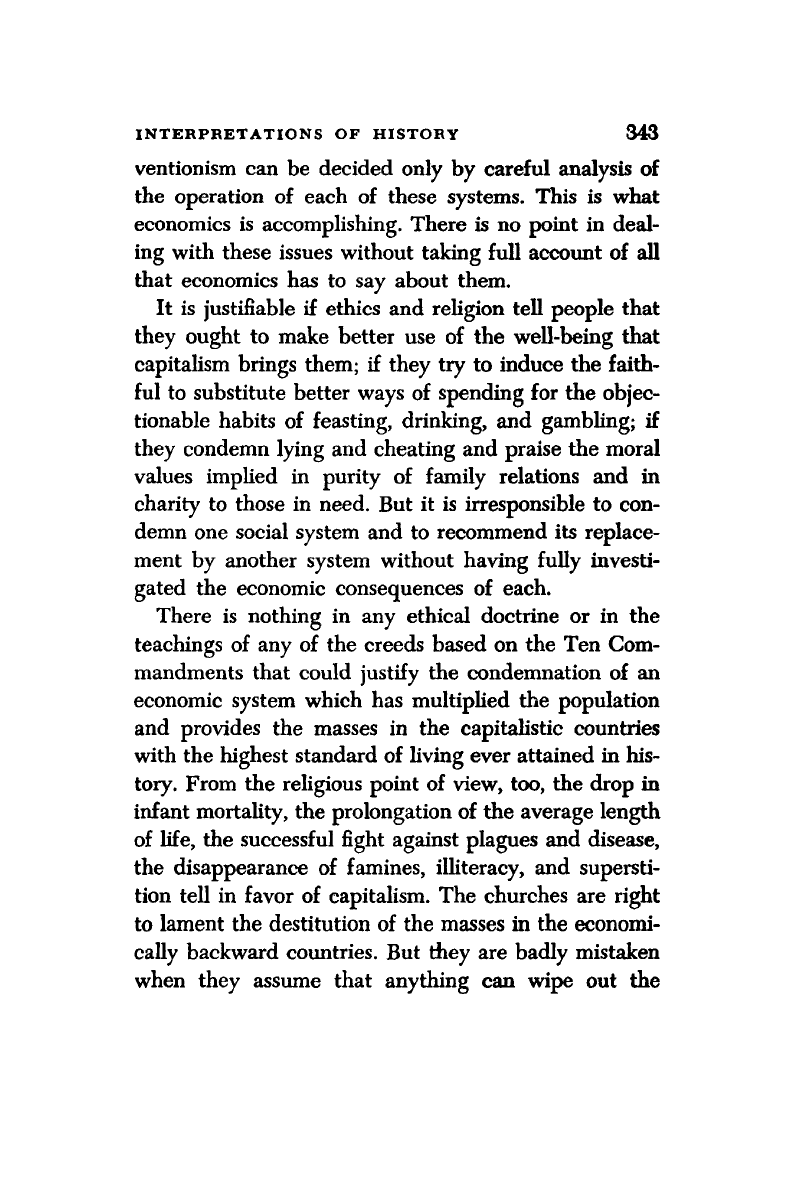
INTERPRETATIONS OF HISTORY 343
ventionism can
be
decided only
by
careful analysis
of
the operation
of
each
of
these systems. This
is
what
economics
is
accomplishing. There
is
no point
in
deal-
ing with these issues without taking full account
of
all
that economics has
to
say about them.
It
is
justifiable
if
ethics and religion tell people that
they ought
to
make better use
of
the well-being that
capitalism brings them;
if
they try
to
induce the faith-
ful to substitute better ways
of
spending for the objec-
tionable habits
of
feasting, drinking, and gambling;
if
they condemn lying and cheating and praise the moral
values implied
in
purity
of
family relations
and in
charity
to
those
in
need. But
it is
irresponsible
to
con-
demn one social system and
to
recommend its replace-
ment
by
another system without having fully investi-
gated
the
economic consequences
of
each.
There
is
nothing
in any
ethical doctrine
or in the
teachings
of
any
of
the creeds based on the Ten Com-
mandments that could justify the condemnation
of an
economic system which has multiplied the population
and provides
the
masses
in the
capitalistic countries
with the highest standard
of
living ever attained in his-
tory. From the religious point
of
view, too, the drop
in
infant mortality, the prolongation
of
the average length
of life, the successful fight against plagues and disease,
the disappearance
of
famines, illiteracy, and supersti-
tion tell
in
favor
of
capitalism. The churches are right
to lament the destitution
of
the masses in the economi-
cally backward countries. But they are badly mistaken
when they assume that anything
can
wipe
out the
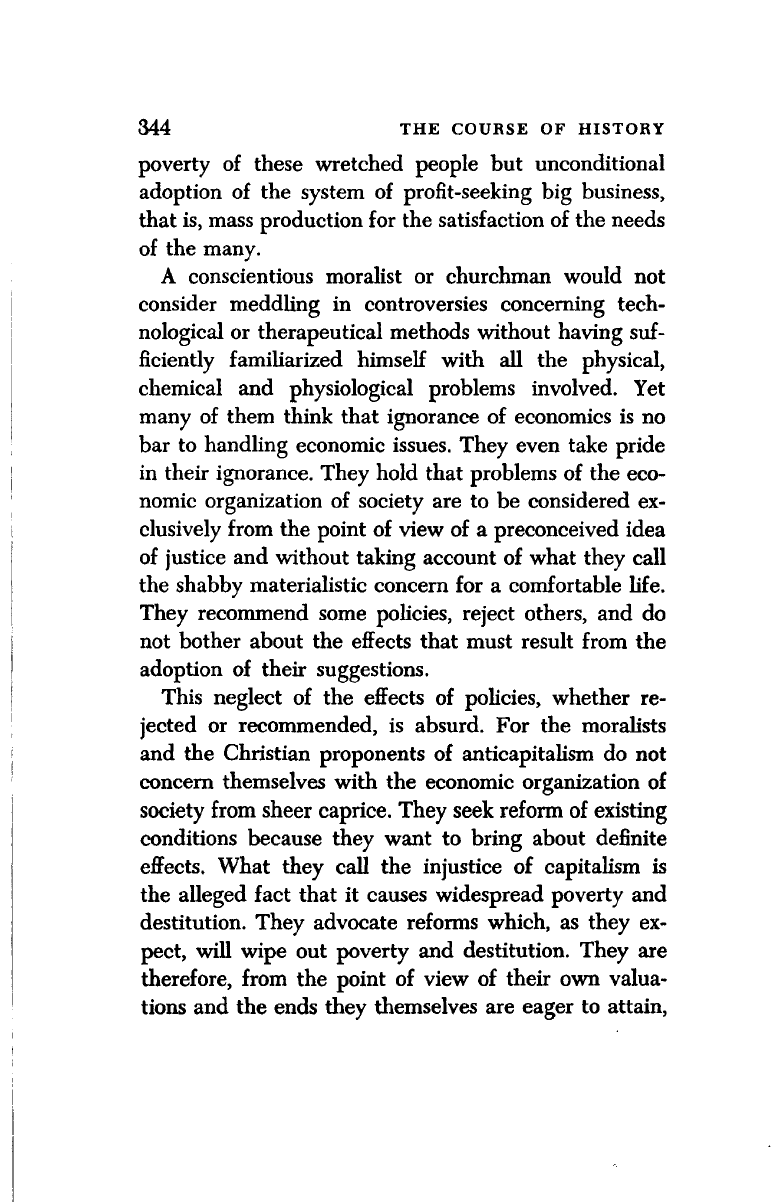
344 THE COURSE OF HISTORY
poverty of these wretched people but unconditional
adoption of the system of profit-seeking big business,
that is, mass production for the satisfaction of the needs
of the many.
A conscientious moralist or churchman would not
consider meddling in controversies concerning tech-
nological or therapeutical methods without having suf-
ficiently familiarized himself with all the physical,
chemical and physiological problems involved. Yet
many of them think that ignorance of economics is no
bar to handling economic issues. They even take pride
in their ignorance. They hold that problems of the eco-
nomic organization of society are to be considered ex-
clusively from the point of view of a preconceived idea
of justice and without taking account of what they call
the shabby materialistic concern for a comfortable life.
They recommend some policies, reject others, and do
not bother about the effects that must result from the
adoption of their suggestions.
This neglect of the effects of policies, whether re-
jected or recommended, is absurd. For the moralists
and the Christian proponents of anticapitalism do not
concern themselves with the economic organization of
society from sheer caprice. They seek reform of existing
conditions because they want to bring about definite
effects. What they call the injustice of capitalism is
the alleged fact that it causes widespread poverty and
destitution. They advocate reforms which, as they ex-
pect, will wipe out poverty and destitution. They are
therefore, from the point of view of their own valua-
tions and the ends they themselves are eager to attain,
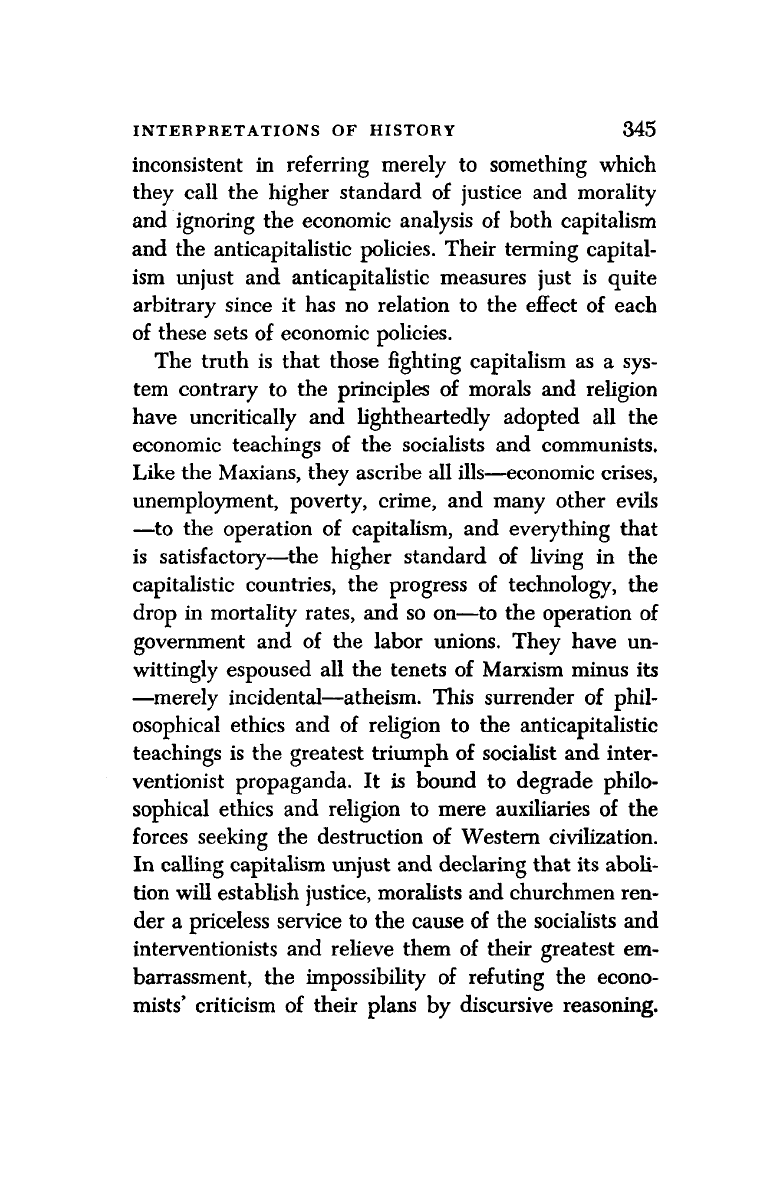
INTERPRETATIONS OF HISTORY 345
inconsistent in referring merely to something which
they call the higher standard of justice and morality
and ignoring the economic analysis of both capitalism
and the anticapitalistic policies. Their terming capital-
ism unjust and anticapitalistic measures just is quite
arbitrary since it has no relation to the effect of each
of these sets of economic policies.
The truth is that those fighting capitalism as a sys-
tem contrary to the principles of morals and religion
have uncritically and lightheartedly adopted all the
economic teachings of the socialists and communists.
Like the Maxians, they ascribe all ills—economic crises,
unemployment, poverty, crime, and many other evils
—to the operation of capitalism, and everything that
is satisfactory—the higher standard of living in the
capitalistic countries, the progress of technology, the
drop in mortality rates, and so on—to the operation of
government and of the labor unions. They have un-
wittingly espoused all the tenets of Marxism minus its
—merely incidental—atheism. This surrender of phil-
osophical ethics and of religion to the anticapitalistic
teachings is the greatest triumph of socialist and inter-
ventionist propaganda. It is bound to degrade philo-
sophical ethics and religion to mere auxiliaries of the
forces seeking the destruction of Western civilization.
In calling capitalism unjust and declaring that its aboli-
tion will establish justice, moralists and churchmen ren-
der a priceless service to the cause of the socialists and
interventionists and relieve them of their greatest em-
barrassment, the impossibility of refuting the econo-
mists*
criticism of their plans by discursive reasoning.
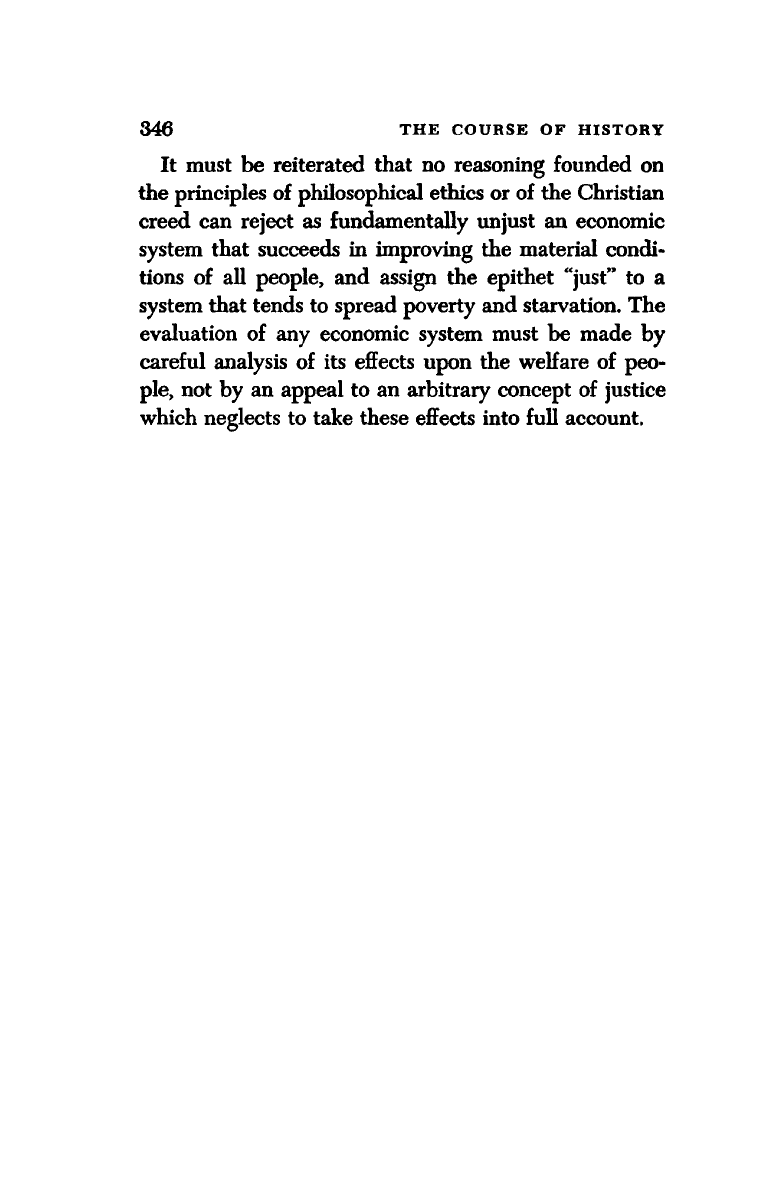
346 THE COURSE OF HISTORY
It must be reiterated that no reasoning founded on
the principles of philosophical ethics or of the Christian
creed can reject as fundamentally unjust an economic
system that succeeds in improving the material condi-
tions of all people, and assign the epithet "just" to a
system that tends to spread poverty and starvation. The
evaluation of any economic system must be made by
careful analysis of its effects upon the welfare of peo-
ple,
not by an appeal to an arbitrary concept of justice
which neglects to take these effects into full account.
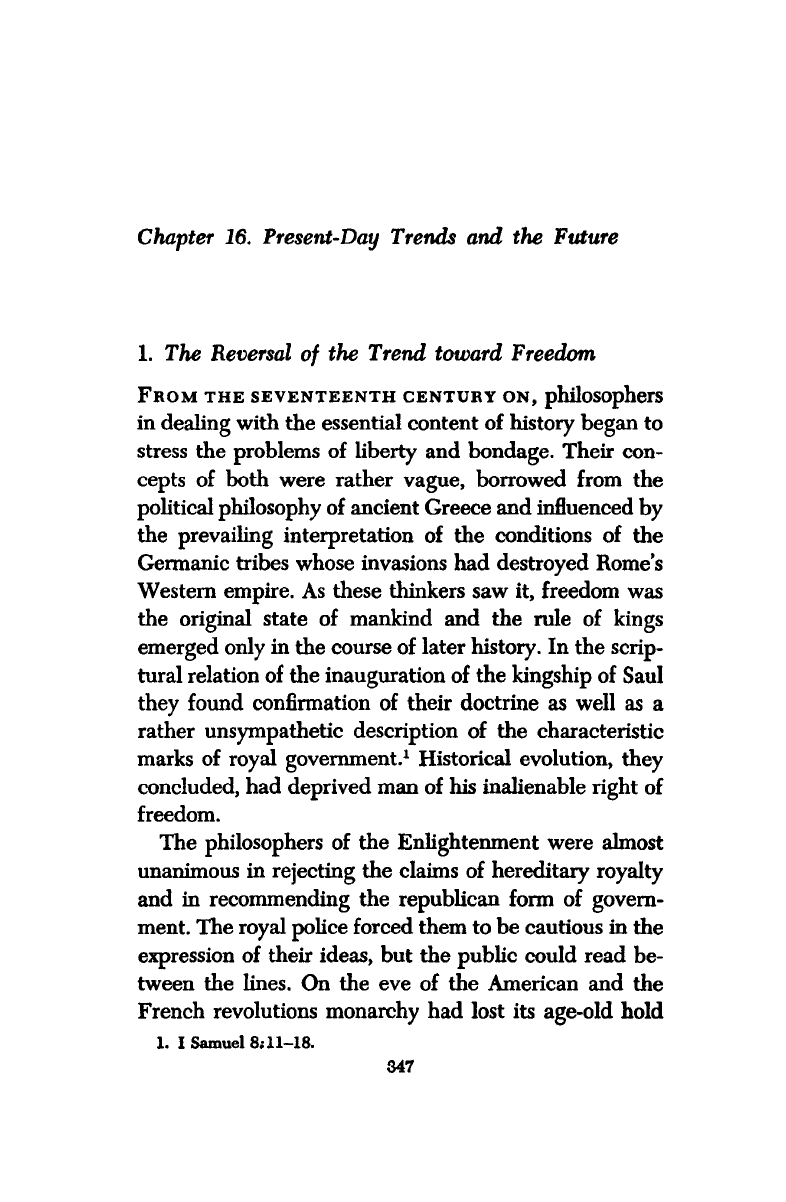
Chapter 16. Present-Day Trends and the Future
1.
The Reversal of the Trend toward Freedom
FROM
THE SEVENTEENTH CENTURY ON, philosophers
in dealing with the essential content of history began to
stress the problems of liberty and bondage. Their con-
cepts of both were rather vague, borrowed from the
political philosophy of ancient Greece and influenced by
the prevailing interpretation of the conditions of the
Germanic tribes whose invasions had destroyed Rome's
Western empire. As these thinkers saw it, freedom was
the original state of mankind and the rule of kings
emerged only in the course of later history. In the scrip-
tural relation of the inauguration of the kingship of Saul
they found confirmation of their doctrine as well as a
rather unsympathetic description of the characteristic
marks of royal government.
1
Historical evolution, they
concluded, had deprived man of his inalienable right of
freedom.
The philosophers of the Enlightenment were almost
unanimous in rejecting the claims of hereditary royalty
and in recommending the republican form of govern-
ment. The royal police forced them to be cautious in the
expression of their ideas, but the public could read be-
tween the lines. On the eve of the American and the
French revolutions monarchy had lost its age-old hold
1. I Samuel 8; 11-18.
347
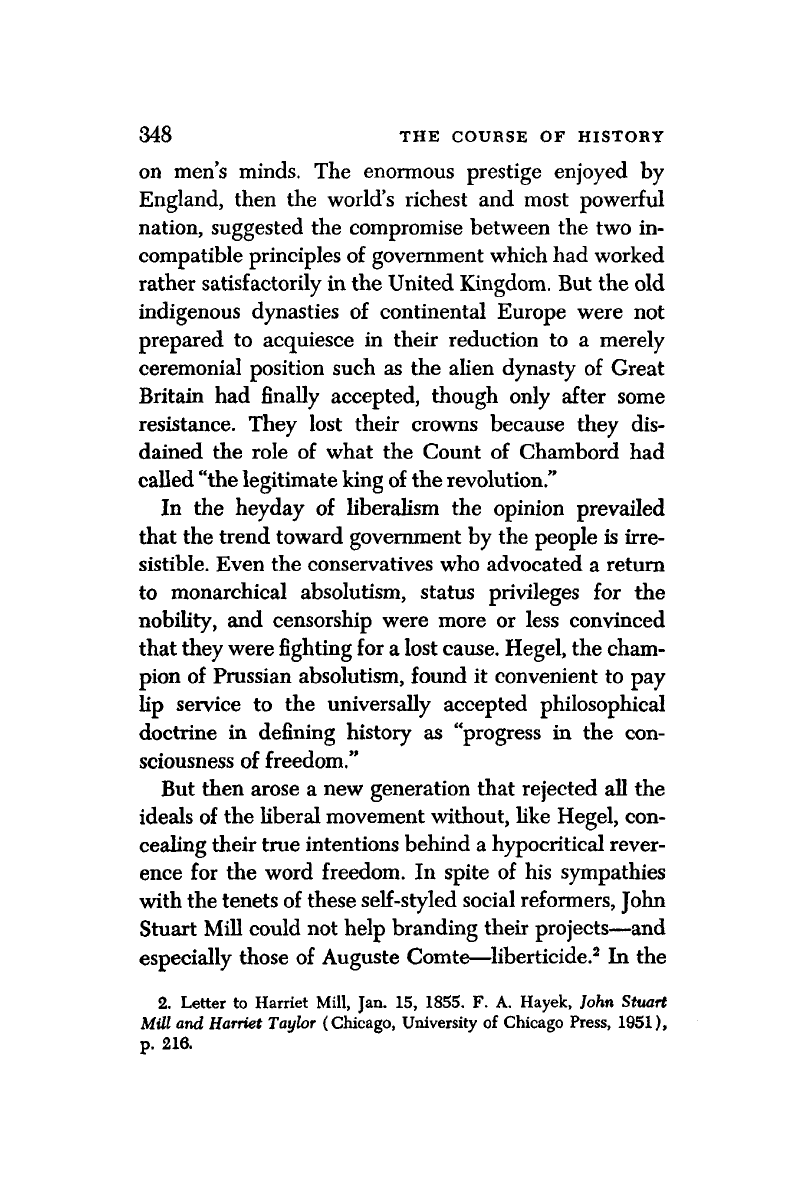
348 THE COURSE OF HISTORY
on men's minds. The enormous prestige enjoyed by
England, then the world's richest and most powerful
nation, suggested the compromise between the two in-
compatible principles of government which had worked
rather satisfactorily in the United Kingdom. But the old
indigenous dynasties of continental Europe were not
prepared to acquiesce in their reduction to a merely
ceremonial position such as the alien dynasty of Great
Britain had finally accepted, though only after some
resistance. They lost their crowns because they dis-
dained the role of what the Count of Chambord had
called "the legitimate king of the revolution."
In the heyday of liberalism the opinion prevailed
that the trend toward government by the people is irre-
sistible. Even the conservatives who advocated a return
to monarchical absolutism, status privileges for the
nobility, and censorship were more or less convinced
that they were fighting for a lost cause. Hegel, the cham-
pion of Prussian absolutism, found it convenient to pay
h'p service to the universally accepted philosophical
doctrine in defining history as "progress in the con-
sciousness of freedom/'
But then arose a new generation that rejected all the
ideals of the liberal movement without, like Hegel, con-
cealing their true intentions behind a hypocritical rever-
ence for the word freedom. In spite of his sympathies
with the tenets of these self-styled social reformers, John
Stuart Mill could not help branding their projects—and
especially those of Auguste Comte—liberticide.
2
In the
2.
Letter to Harriet Mill, Jan. 15, 1855. F. A. Hayek, John Stuart
Mill and Harriet Taylor (Chicago, University of Chicago Press, 1951),
p.
216.
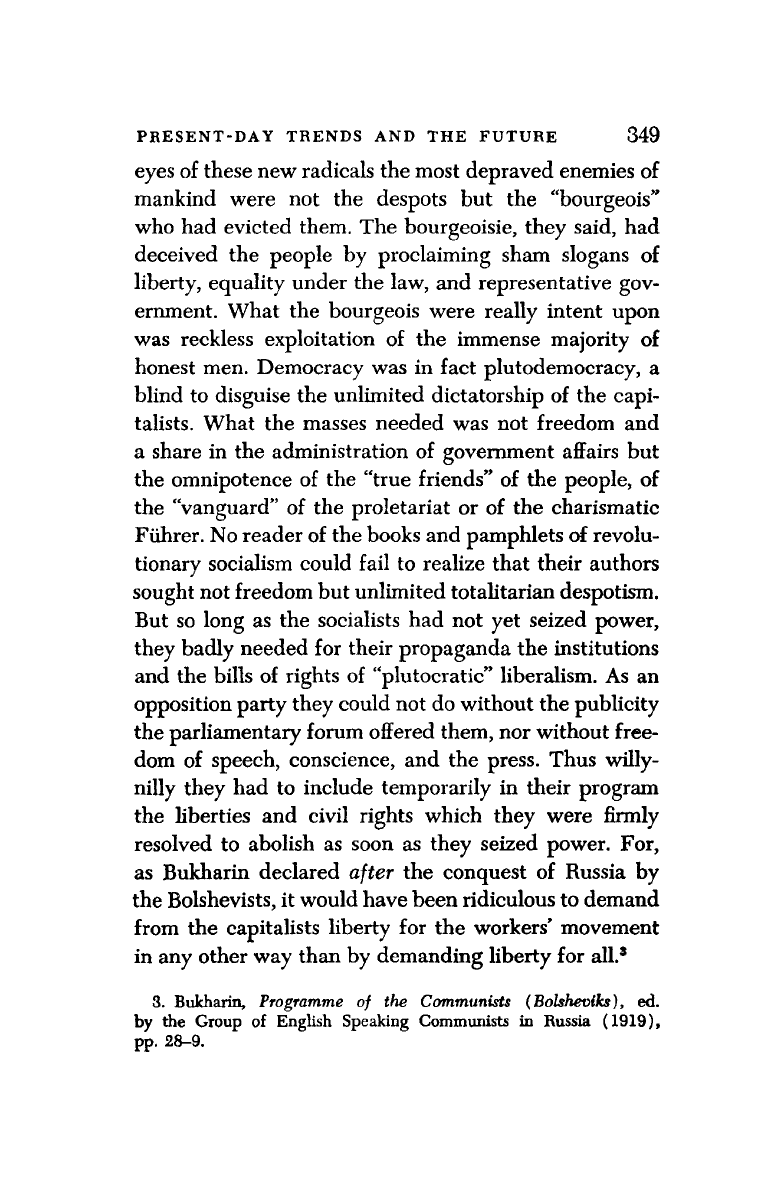
PRESENT-DAY TRENDS AND THE FUTURE 349
eyes
of
these new radicals the most depraved enemies of
mankind were
not the
despots
but the
"bourgeois"
who
had
evicted them.
The
bourgeoisie, they said,
had
deceived
the
people
by
proclaiming sham slogans
of
liberty, equality under
the
law,
and
representative gov-
ernment. What
the
bourgeois were really intent upon
was reckless exploitation
of the
immense majority
of
honest men. Democracy was
in
fact plutodemocracy,
a
blind
to
disguise the unlimited dictatorship
of
the capi-
talists. What
the
masses needed
was not
freedom
and
a share
in the
administration
of
government affairs
but
the omnipotence
of the
"true friends"
of the
people,
of
the "vanguard*'
of the
proletariat
or of the
charismatic
Fuhrer. No reader
of
the books and pamphlets
of
revolu-
tionary socialism could fail
to
realize that their authors
sought not freedom but unlimited totalitarian despotism.
But
so
long
as the
socialists
had not yet
seized power,
they badly needed
for
their propaganda the institutions
and
the
bills
of
rights
of
"plutocratic" liberalism.
As an
opposition party they could not do without the publicity
the parliamentary forum offered them, nor without free-
dom
of
speech, conscience,
and the
press. Thus willy-
nilly they
had to
include temporarily
in
their program
the liberties
and
civil rights which they were firmly
resolved
to
abolish
as
soon
as
they seized power.
For,
as Bukharin declared after
the
conquest
of
Russia
by
the Bolshevists,
it
would have been ridiculous to demand
from
the
capitalists liberty
for the
workers' movement
in any other way than by demanding liberty
for
all.
3
3.
Bukharin, Programme
of the
Communists (Bolsheviks),
ed.
by
the
Group
of
English Speaking Communists
in
Russia (1919),
pp.
28-9.
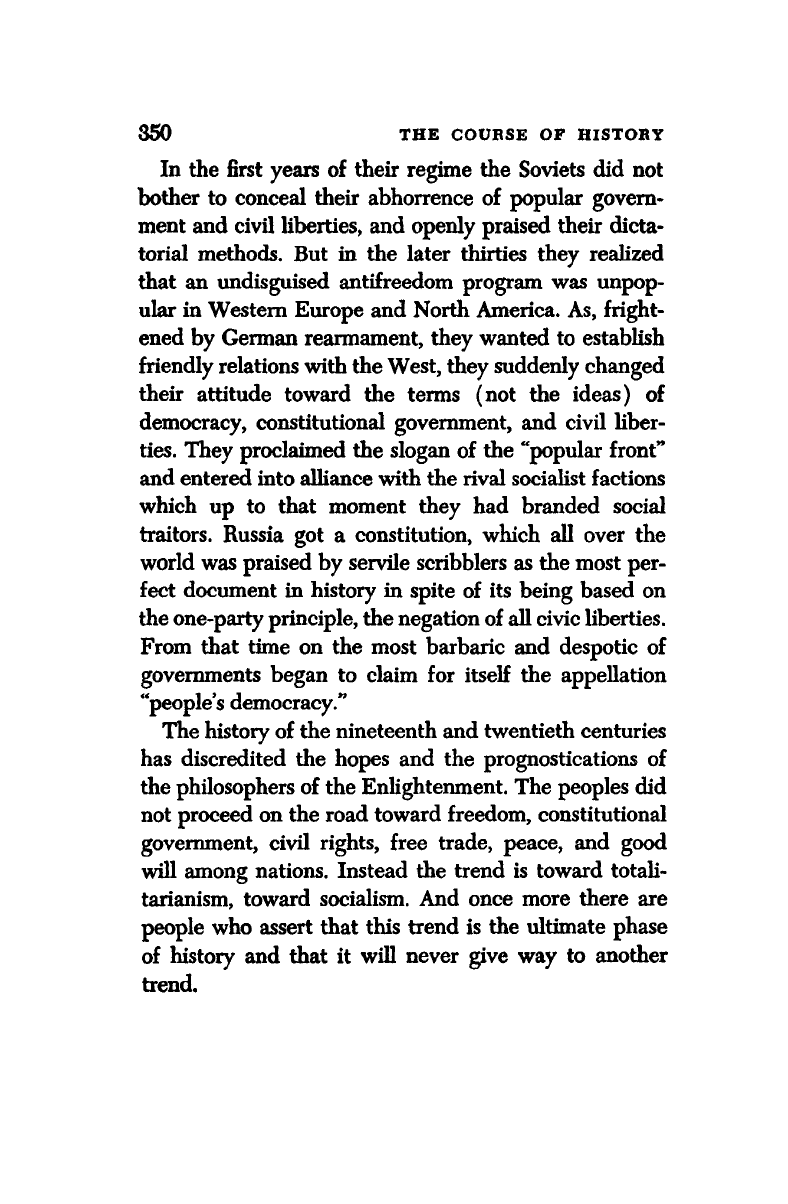
350 THE COURSE OF HISTORY
In the first years of their regime the Soviets did not
bother to conceal their abhorrence of popular govern-
ment and civil liberties, and openly praised their dicta-
torial methods. But in the later thirties they realized
that an undisguised antifreedom program was unpop-
ular in Western Europe and North America. As, fright-
ened by German rearmament, they wanted to establish
friendly relations with the West, they suddenly changed
their attitude toward the terms (not the ideas) of
democracy, constitutional government, and civil liber-
ties.
They proclaimed the slogan of the "popular front"
and entered into alliance with the rival socialist factions
which up to that moment they had branded social
traitors. Russia got a constitution, which all over the
world was praised by servile scribblers as the most per-
fect document in history in spite of its being based on
the one-party principle, the negation of all civic liberties.
From that time on the most barbaric and despotic of
governments began to claim for itself the appellation
"people's democracy."
The history of the nineteenth and twentieth centuries
has discredited the hopes and the prognostications of
the philosophers of the Enlightenment. The peoples did
not proceed on the road toward freedom, constitutional
government, civil rights, free trade, peace, and good
will among nations. Instead the trend is toward totali-
tarianism, toward socialism. And once more there are
people who assert that this trend is the ultimate phase
of history and that it will never give way to another
trend.
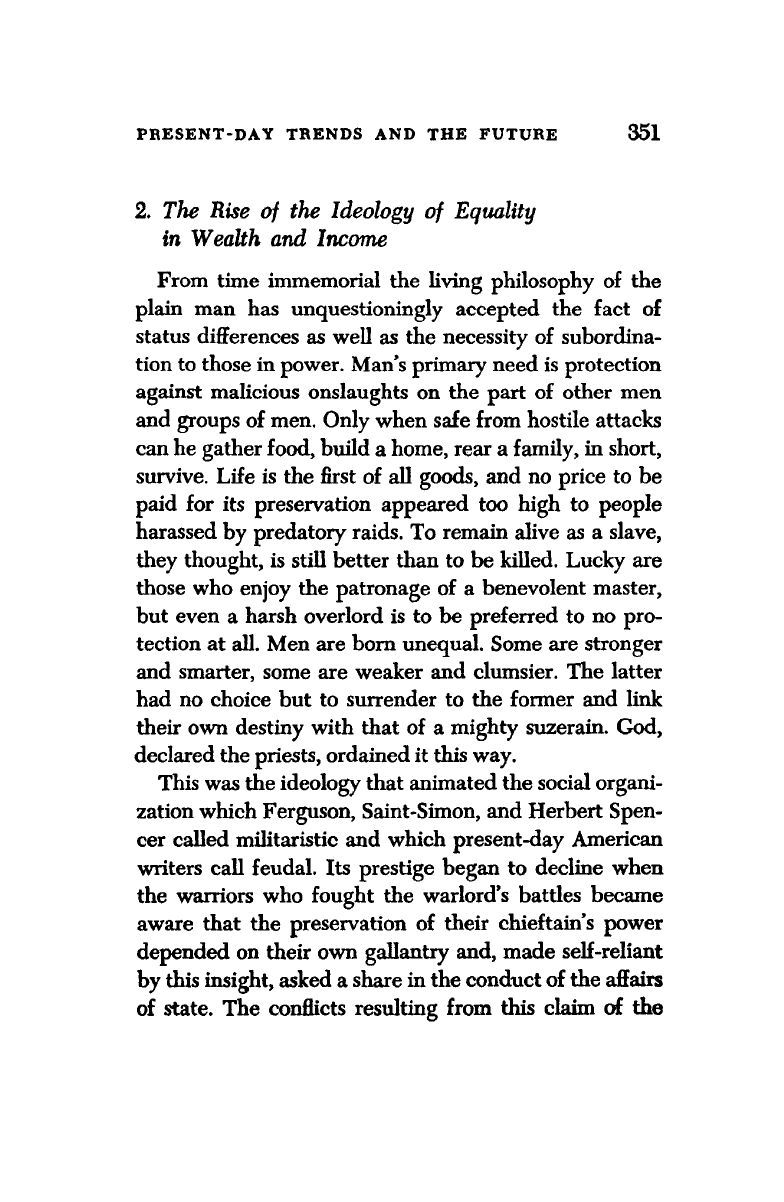
PRESENT-DAY TRENDS AND THE FUTURE 351
2.
The Rise of the Ideology of Equality
in Wealth and Income
From time immemorial the living philosophy of the
plain man has unquestioningly accepted the fact of
status differences as well as the necessity of subordina-
tion to those in power. Man's primary need is protection
against malicious onslaughts on the part of other men
and groups of men. Only when safe from hostile attacks
can he gather food, build a home, rear a family, in short,
survive. Life is the first of all goods, and no price to be
paid for its preservation appeared too high to people
harassed by predatory raids. To remain alive as a slave,
they thought, is still better than to be killed. Lucky are
those who enjoy the patronage of a benevolent master,
but even a harsh overlord is to be preferred to no pro-
tection at all. Men are born unequal. Some are stronger
and smarter, some are weaker and clumsier. The latter
had no choice but to surrender to the former and link
their own destiny with that of a mighty suzerain. God,
declared the priests, ordained it this way.
This was the ideology that animated the social organi-
zation which Ferguson, Saint-Simon, and Herbert Spen-
cer called militaristic and which present-day American
writers call feudal. Its prestige began to decline when
the warriors who fought the warlord's battles became
aware that the preservation of their chieftain's power
depended on their own gallantry and, made self-reliant
by this insight, asked a share in the conduct of the affairs
of state. The conflicts resulting from this claim of the
